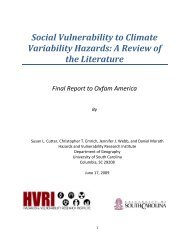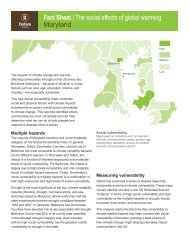Poverty Footprint Study on how the Coca Cola - Oxfam America
Poverty Footprint Study on how the Coca Cola - Oxfam America
Poverty Footprint Study on how the Coca Cola - Oxfam America
Create successful ePaper yourself
Turn your PDF publications into a flip-book with our unique Google optimized e-Paper software.
Micro Distributi<strong>on</strong> Centers apply <strong>the</strong> supply chain knowledge of <strong>the</strong> <strong>Coca</strong>-<strong>Cola</strong> system to support small<br />
and medium enterprises to become distributors of <strong>Coca</strong>-<strong>Cola</strong> products. <strong>Coca</strong>-<strong>Cola</strong> and SABMiller work<br />
with local entrepreneurs to build distributi<strong>on</strong> hubs from which products are delivered using bicycles,<br />
pushcarts or motorcycles to hard-to-reach small retail outlets in urban and peri-urban centers in<br />
developing countries.<br />
Distributi<strong>on</strong><br />
In El Salvador, two-thirds of <strong>Coca</strong>-<strong>Cola</strong> products<br />
are distributed directly by SABMiller’s bottling plant,<br />
ILC, and <strong>the</strong> remaining porti<strong>on</strong> are distributed by<br />
independent depositos (urban/rural warehouses),<br />
mayoristas (rural wholesalers) and minibodegas<br />
(small mostly urban warehouses).<br />
In both El Salvador and Zambia, SABMiIIer’s bottlers<br />
help distributors develop and grow <strong>the</strong>ir businesses<br />
by providing incentives such as credit and free crates<br />
of beverages based <strong>on</strong> distributi<strong>on</strong> volume targets.<br />
In El Salvador, distributors interviewed for this study<br />
indicated that ILC had provided <strong>the</strong>m with training<br />
<strong>on</strong> business skills and marketing in <strong>the</strong> past, but<br />
it had not d<strong>on</strong>e so recently. They would welcome<br />
more training opportunities. Owners of depositos<br />
interviewed for this study reported having a good<br />
source of income, <strong>on</strong> average more than twice <strong>the</strong><br />
minimum wage, and that sales of <strong>Coca</strong>-<strong>Cola</strong> products<br />
represented over half of <strong>the</strong>ir average profits. As<br />
expected, owners of smaller warehouses or small<br />
retailers reported much lower m<strong>on</strong>thly profits.<br />
Owners of MDCs in Zambia reported a desire for<br />
increased access to marketing training and materials.<br />
They also indicated that licensing regulati<strong>on</strong>s were<br />
a hindrance to business, and <strong>the</strong>y were seeking<br />
improved dialogue with <strong>the</strong>ir city council <strong>on</strong> this<br />
topic. In 2008, <strong>the</strong> Harvard Kennedy School and <strong>the</strong><br />
Internati<strong>on</strong>al Finance Corporati<strong>on</strong> c<strong>on</strong>ducted<br />
a study sp<strong>on</strong>sored by The <strong>Coca</strong>-<strong>Cola</strong> Company<br />
of <strong>the</strong> MDC model in East Africa. They found that<br />
<strong>the</strong> model presented significant benefit to <strong>the</strong><br />
<strong>Coca</strong>-<strong>Cola</strong> business, enabling it to reach c<strong>on</strong>sumers<br />
in dense, urban areas, and provided much-needed<br />
opportunities for local entrepreneurs. They identified<br />
a number of opportunities for tailoring of <strong>the</strong> model<br />
to increase its positive development impacts while<br />
not sacrificing its business benefits; for example, by<br />
formalizing <strong>the</strong> owner recruitment process, improving<br />
access to finance and supporting entrepreneurship<br />
educati<strong>on</strong> programs.<br />
It is important to recognize that MDC and o<strong>the</strong>r<br />
independent distributor workplaces are in <strong>the</strong> informal<br />
sector. As a result, employees may not have written<br />
c<strong>on</strong>tracts, as reported by three deposito employees<br />
interviewed in El Salvador. These employees also<br />
reported earning lower than <strong>the</strong> minimum wage and<br />
did not have significant income from o<strong>the</strong>r sources.<br />
The working envir<strong>on</strong>ments in <strong>the</strong>se centers also<br />
present potential safety challenges, since <strong>the</strong>y are<br />
often in small spaces with deteriorated infrastructure<br />
and limited access to basic amenities such as water<br />
and sanitati<strong>on</strong>.<br />
52 Exploring <strong>the</strong> links between internati<strong>on</strong>al business and poverty reducti<strong>on</strong><br />
<strong>Coca</strong>-<strong>Cola</strong> products arrive at distributi<strong>on</strong> centers by<br />
truck, some of which are driven by drivers employed<br />
by SABMiller’s bottlers and some of which are<br />
independent trucking firms. In El Salvador, ILC has<br />
sought to shift drivers from formal employment within<br />
ILC into independent c<strong>on</strong>tracts as owner-drivers<br />
to increase distributi<strong>on</strong> efficiencies. In this role, <strong>the</strong><br />
truck drivers rent <strong>the</strong> truck from ILC and cover <strong>the</strong>ir<br />
own expenses while distributing products. In two<br />
years’ time, <strong>the</strong> drivers have <strong>the</strong> opti<strong>on</strong> to buy <strong>the</strong><br />
truck. Owner-drivers receive <strong>the</strong> same benefits and<br />
support as normal ILC employees. However, some<br />
drivers indicated <strong>the</strong>y were c<strong>on</strong>cerned that this new<br />
approach would mean less security of employment.<br />
Self-employed retailers<br />
The sale of <strong>Coca</strong>-<strong>Cola</strong> products supports vital<br />
self-employment and employment opportunities in<br />
both countries. Many entrepreneurs in traditi<strong>on</strong>ally<br />
excluded groups, such as women and <strong>the</strong> elderly,<br />
pursue livelihoods in this way. Women are far more<br />
likely to find employment in <strong>the</strong> retail sector in El<br />
Salvador than in Zambia. However, small-scale<br />
retailers are in <strong>the</strong> informal sector, and, as such,<br />
<strong>the</strong>y face vulnerabilities such as lack of access to<br />
private health care and lack of job security. Most have<br />
incomes close to <strong>the</strong> local minimum wage equivalent<br />
or less.<br />
For retailers, sales of <strong>Coca</strong>-<strong>Cola</strong> products have<br />
relatively high margins compared to sales of o<strong>the</strong>r<br />
c<strong>on</strong>sumer goods products but not in comparis<strong>on</strong><br />
with competitor beverages <strong>on</strong> a unit basis. However,<br />
<strong>Coca</strong>-<strong>Cola</strong> volumes tend to be higher than competing<br />
brands and <strong>the</strong>refore <strong>the</strong> total c<strong>on</strong>tributi<strong>on</strong> to income<br />
by <strong>Coca</strong>-<strong>Cola</strong> products, for retailers, is higher. As<br />
profit margins are relatively low <strong>on</strong> individual unit<br />
sales, store owners in both countries reported<br />
selling <strong>Coca</strong>-<strong>Cola</strong> products for higher than <strong>the</strong><br />
recommended retail price to boost <strong>the</strong>ir margins.<br />
The <strong>Coca</strong>-<strong>Cola</strong>/SABMiller value chain supports retail<br />
sales by providing marketing materials, mentoring<br />
retailers as needed to improve <strong>the</strong>ir business skills,<br />
and, if <strong>the</strong> retailers have a sufficiently large volume<br />
of sales, The <strong>Coca</strong>-<strong>Cola</strong> Company provides assets<br />
such as coolers or iceboxes as needed. Fur<strong>the</strong>rmore,<br />
<strong>the</strong> <strong>Coca</strong>-<strong>Cola</strong>/SABMiller value chain encourages<br />
retailers to expand <strong>the</strong>ir portfolio of products to grow<br />
<strong>the</strong>ir businesses.




